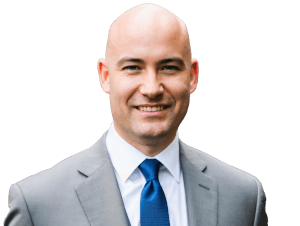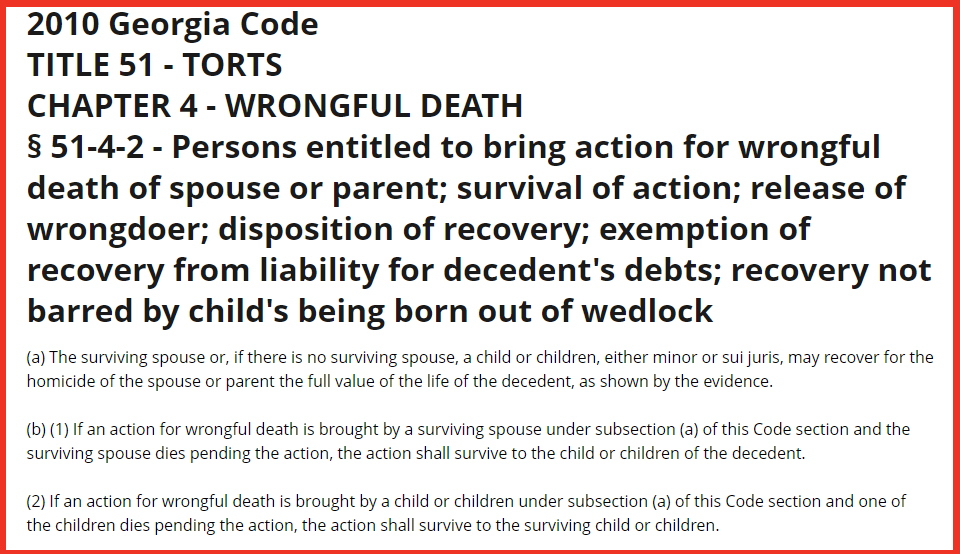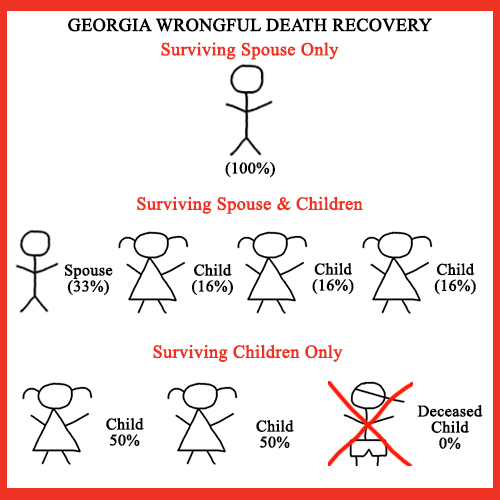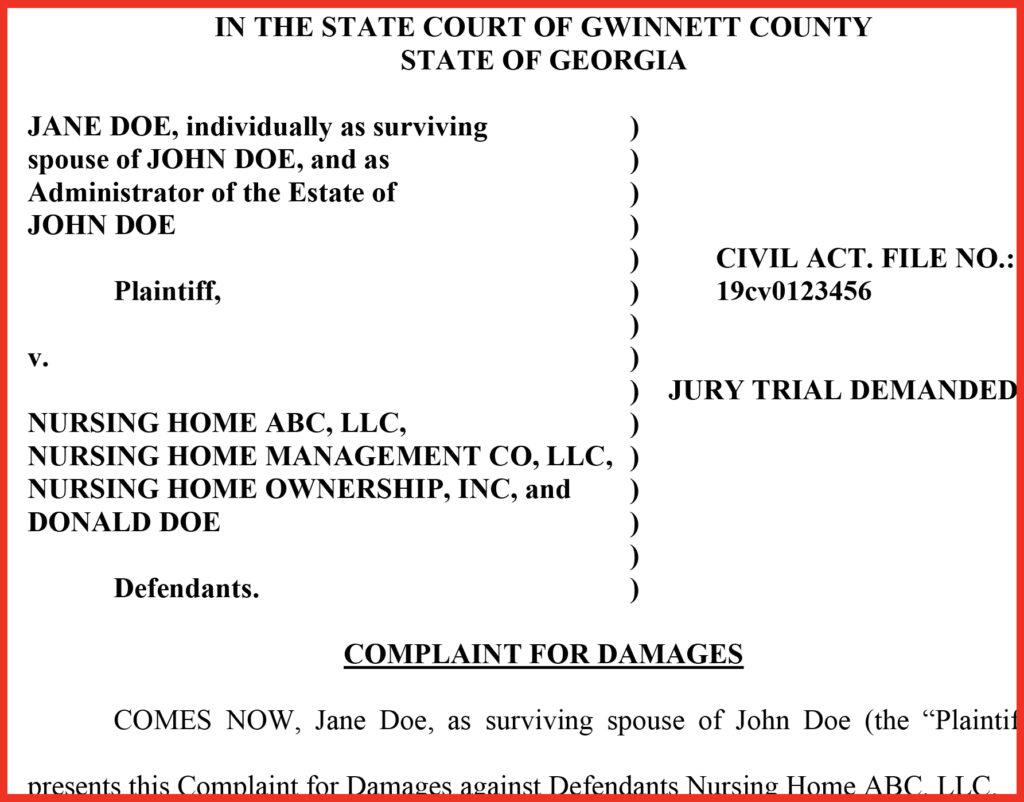Under the Georgia Wrongful Death Act, if a resident is killed by the wrongful act of a nursing home (or nursing home employee), then the resident’s family may bring a wrongful death claim. A wrongful death claim is separate from a claim brought by the resident’s Estate for personal injury. Please feel free to read the information below or call for a free consultation with one of our Georgia nursing home wrongful death lawyers today.
Georgia Wrongful Death Quick Facts
- If the resident is survived by a spouse, then that spouse may bring the wrongful death claim. If there is no spouse, then any surviving children may bring the claim. If there is neither a spouse or surviving child, then the Administrator of the resident’s Estate may bring the claim.
- The recovery allowable in a wrongful death claim is for the “full value of life” from the perspective of the resident. For most nursing home residents, this means the relationships with children, grandchildren, and old friends acquired after a lifetime of living.
- The statute of limitations for wrongful death claims is generally two years from the date of death. Sometimes, that amount of time may be shortened or lengthened.
- The wrongful death claim is separate from claims made by the resident’s Estate for pain and suffering, medical bills, and other damages.
For a free legal consultation with a nursing home wrongful death lawyer serving Georgia, call

How Do You Bring a Case Against a Nursing Home for Wrongful Death?
When suing a nursing home for wrongful death, most often there will be two claims. First is the wrongful death claim. The second is the claim brought by the Estate.
Wrongful Death Claim
In a claim for wrongful death, a plaintiff asks a jury (or arbitration panel) to consider the “full value of the life” of the resident. “Full value of live” is discussed more in depth below, but mostly involves considering the enrichment the person had to others. In other words, what advice, counsel, stories, hugs, laughs, or presence, did the resident have left to give?
Estate Claim
The Estate is allowed to bring claims on behalf of the resident for personal injury. These claims include recovery for the resident’s pain and suffering, medical bills, and funeral expenses. The Administrator of the Estate is in charge of the Estate claims. If there is no Estate set up, that’s OK. However, an Estate must be set up before any Estate claims may be brought against the nursing home.
Georgia Nursing Home Wrongful Death Lawyer Near Me (678) 823-7678
Which Surviving Family Member Brings a Georgia Wrongful Death Claim?
A wrongful death claim is brought by, and in the name of, a surviving spouse or child (or when there is neither, the Estate). In other words, the named plaintiff for the wrongful death claim is either the spouse or the child, not the resident or the resident’s Estate (with one exception).
The claim for wrongful death, unlike many other claims, was created by
statute. Therefore, there’s very little wiggle room when it comes to who brings the claim. Even if the resident was closest to a cousin, friend, sister, or niece, only the resident’s spouse or children may bring the wrongful death claim. Even if the children are no longer a part of the resident’s life.
There are only two exceptions to this rule. First, the resident’s grandchild may bring the claim if the resident’s child was an original claimant in a wrongful death action, and then dies during the pendency of the claim. Second, as mentioned, if there are no children or spouse, then the Administrator of the Estate brings the claim.
- The Georgia Wrongful Death Act allows families to sue nursing homes for the death of loved ones.

Recovery in a Wrongful Death Case
In a wrongful death claim, the jury is allowed to award money equal to the “full value of the life” of the deceased resident from the perspective of the deceased resident. But what does this actually mean?
The “full value of life” has two components: Economic and Intangible. Brock v. Wedincamp, 253 Ga. App. 275 (2002).
Economic value refers to the money that the deceased resident would have earned. In some instances, it may also refer to the value for things like performing chores, babysitting grandchildren, or caring for other family members. As you can guess, economic value is not commonly requested in nursing home wrongful death claims. Most nursing home residents have long since stopped earning a living.
Intangible value, from the eyes of the deceased resident, means the worth attached to the truly meaningful activities of life: seeing a sunset, visiting with life-long friends, praying, laughing at a joke, and watching children interact with grandchildren. A jury will hear evidence regarding the life of the resident, including career, religious affiliation, hobbies, and family roles.
In short, what value does one place on offering dating advice to a teenage grandchild, hearing a former coworker explain an inside joke, or sitting down to Thanksgiving dinner with family? These are the things that make life worth living and this is what a jury is asked to consider in a wrongful death claim.
In an Estate claim, the jury awards money in an amount equal to the pain and suffering experienced by the resident prior to the death, as well as related medical bills and funeral expenses.
A Georgia nursing home wrongful death lawyer can help you and your family with proving a case. Call us for a free consultation (678) 823-7678.

What is a Nursing Home Wrongful Death Case Worth?
Though there is never a guarantee, nursing home wrongful death claims can range from a few thousand to several million, and everywhere in between. Many factors affect the value of a case in Georgia. Here are a list of items that will affect recovery value, whether through settlement, arbitration award, or jury verdict:
- County: The county in which the lawsuit is filed can play a role in settlement value. Certain counties are notorious for favoring defendants or plaintiffs. Some counties are considered “conservative,” meaning that verdicts tend to be low. Others are more plaintiff-friendly.
- Arbitration: Arbitration awards are statistically lower than verdicts. Nursing homes know this (which is why they often sneak them into admission agreements). As such, this will affect settlement value.
- Causation: The link between the injury and the nursing home’s negligent act is critical. Without it, there is no case. So, where there is overwhelming evidence that the nursing home’s action is the direct cause of the injury, to the exclusion of all others, the higher the value may be.
- Corporate Neglect: Death as a result of neglect is one component of a case. Why was there neglect in the first place? Where there is evidence of intentional understaffing or underfunding, awards tend to be higher.
- The Georgia Wrongful Death Act allows recovery to certain family members of the deceased nursing home resident.
Who Recovers Money in a Georgia Wrongful Death Case?
In the end, maximizing recovery against the nursing home is the main goal. Money recovered typically goes to the surviving spouse or children according to the Georgia Wrongful Death Act.
- Surviving Spouse Only: If there is only a surviving spouse (no surviving children), then that spouse would receive all of the recovery in a wrongful death claim.
- Surviving Spouse and Children: If there is a surviving spouse and children, the recovery is shared equally. However, the surviving spouse cannot receive less than one-third of the recovery, regardless of the number of children.
- Surviving Children: If there is no surviving spouse, the surviving children share the recovery equally. Only children that survive the resident recover. No recovery “flows through” a predeceased child of the resident (i.e., a resident’s grandchild would not recover through a predeceased child of the resident).
- Estate: If there are no surviving spouse or children, then the Estate takes all of the recovery.
Who Do You Sue in a Nursing Home Wrongful Death Case?
Often, there are many parties that contribute to the death of residents. While the defense likes to blame other people or even the resident, or characterize neglect as a “simple accident,” the truth is, a resident’s death is often the end result of systematic problems. Here is a list of defendants in a normal nursing home wrongful death case.
- Our firm investigates every case to determine all the companies and individuals that may be liable.
- Nursing Home: The nursing home itself will be the primary defendant.
- Management Company: Nursing homes are often controlled by a “corporate office” that actually holds the purse strings. These management companies are often the reason why the facilities are understaffed.
- Parent Company: Nursing homes often sit within a chain of other companies.
- Administrator: In Georgia, administrators and executive directors may be held personally liable for torts committed by the nursing homes.
- Director: Directors of Nursing are often named as defendants for systematically failing to provide quality care.
Improve your chances of a successful recovery by calling us and speaking with a Georgia nursing home wrongful death lawyer today.
How is Wrongful Death Caused by Nursing Home Neglect or Abuse?
Wrongful death often occurs through nursing home neglect or abuse – when a nursing home or one of its employees becomes careless towards a resident to whom the nursing home owes a duty of care. A caregiver may ignore signs of illness or infection in a resident and fail to administer treatment in time to save the resident’s life. Or a caregiver may fail to help a resident who needs assistance walking, causing the resident to fall and sustain serious injuries which may result in death.
On a larger scale, the nursing home itself may exercise negligence by creating a hazardous environment through wet floors or dim lighting. Or a nursing home may fail to hire enough staff members, fail to train them correctly, or fail to screen prospective employees before hiring – all instances of neglect that can lead to serious injury, illness, and death for nursing home residents.
What Should a Nursing Home Do to Prevent Wrongful Death?
A nursing home should do all it reasonably can to protect residents from harm. This includes preventing abuse through employee
background checks and careful screening throughout the interview process, as well as close supervision after hiring. Nursing homes should train all employees to recognize signs of abuse and report any abuse immediately, and when a nursing home manager encounters abuse, he or she should intervene as soon as possible.
To prevent neglect, nursing homes should hire enough staff members to maintain a high level of care for all residents, and should make sure all staff are medically trained and equipped to care for a resident’s specific needs. Nursing homes should constantly keep their facilities safe and sanitary to prevent falls and the spread of infection – both of which can lead to wrongful death.
Georgia Statute of Limitations for Wrongful Death Claims
Generally, the statute of limitations (the amount of time that you have to sue) for wrongful death is two years from the date of death. However, there are some circumstances that would make that time shorter or longer.
The statute of limitations for an Estate’s claims is two years from the date of injury. Again, this time can be extended under certain circumstances. For example, claims held by the Estate may be “tolled” (meaning, paused) for the amount of time it takes the family to set up the Estate with the Probate Court. O.C.G.A. 9-3-92.
What Should a Family Do after a Loved One Dies in a Nursing Home?
If your loved one died in a nursing home and you suspect abuse or neglect, you should take time to grieve, mourn, and be with your family.
Resist the temptation to feel guilt for having not acted or for placing your loved one in the facility. As a family member, your job is to love and provide companionship, the nursing home’s job is to provide appropriate medical care.
As soon as possible, it will be necessary to take the following actions following your loved one’s passing.
- File a Complaint: Contact the Georgia Department of Community Health and file a complaint. You can call or use the online form.
- File a Grievance: If possible, file a written grievance with the nursing home. Under state and federal law, they are required to investigate.
- Contact Law Enforcement: Depending on the type of injury, the local police department may get involved. For example, where there has been a physical or sexual assault.
- Document the Incident: Take pictures of everything relevant, including wounds, bruises, locations, etc.
- Request Nursing Home Records: Request your loved ones records from the nursing home as soon as possible.
Finally, contact a Georgia nursing home wrongful death lawyer as soon as possible. A lawyer can begin an investigation into the events.
Call a Georgia Nursing Home Wrongful Death Attorney
If your loved one passed away as a result of nursing home abuse or neglect, you are likely experiencing a wide range of emotions: anger, guilt, sadness. Please know that we are there for you. We hope that this website is helpful for you.
If you would like a free consultation with a Georgia nursing home wrongful death lawyer, please call us.







